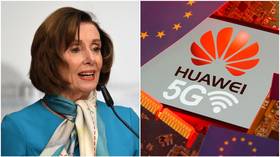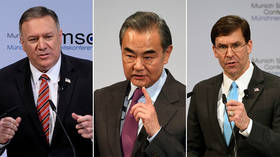‘Is the democratic system so fragile?’ Audience applauds as Pelosi’s Huawei scare session prompts rebuke from Chinese delegate

Nancy Pelosi, who brought a squad of US lawmakers to Munich, argued passionately that dropping Huawei technology is about keeping democracy, until an unorthodox intervention by a Chinese diplomat left her facing a tough argument.
“National security, economy and values all come together on the Huawei issue,” Pelosi proclaimed during the third day of the Munich Security Conference (MSC), devoting the bulk of her press briefing to Huawei and Beijing’s “digital autocracy.”
Adopting or not adopting Huawei solutions – particularly their 5G products – “is about choosing autocracy over democracy on the information highway,” she insisted, likening the process to “putting the state police in the pocket of every consumer in these countries.”
As someone who helped renew the NSA’s spying powers two years ago, Pelosi wisely chose to refrain from mentioning US mass surveillance, famously exposed by Edward Snowden and other whistleblowers.
She also failed to say what makes America’s surveillance more democratic than that which is attributed to Huawei. Her subsequent remarks, however, shed some light on America’s rationale behind targeting the Chinese tech giant.
“Why would we give license to the Chinese to direct the traffic on that information highway of the future?” the speaker asked bluntly, adding, “There’s a big price to pay.”
Pelosi took aim at Huawei the day before, when she was a keynote speaker at MSC Saturday’s panel. Her passionate speech, delivered from an autocue, went awry when Fu Ying, a former Chinese envoy to the UK and a career diplomat, stole the show.
“I think my knowledge about how the world works is that technologies are tools,” Fu said, speaking in a quiet, reproving voice.
U.S. House Speaker @SpeakerPelosi plays up "Huawei threat" claim at Munich Security Conference. A Chinese diplomat's response draws applause from the audience. #Huaweipic.twitter.com/IbG8856xGN
— China Xinhua News (@XHNews) February 16, 2020
She pointed out that China had used all kinds of Western technologies – including those of Microsoft, IBM, and Amazon – but had “maintained its political system, the system led by the Communist Party; it’s not threatened by the technologies.”
How come if Huawei technologies, with 5G, are introduced into Western countries, [they] will threaten the political system? Do you really think the democratic system is so fragile that it could be threatened by this single hi-tech company, Huawei?
Pelosi wasn’t the only US official in Munich to stir up fears over China. Defense Secretary Mark Esper and Secretary of State Mike Pompeo had even stronger words to say on the issue, claiming that Huawei’s 5G technology is part of Beijing’s “nefarious strategy” of undermining Western infrastructure and serves as the “Trojan horse” of Chinese intelligence.
Also on rt.com 'TROJAN HORSES' for Beijing intelligence: Pompeo takes aim at Huawei & other Chinese tech companiesSpeaking after the US top brass, Chinese Foreign Minister Wang Yi used the floor to hit back. Calling the US allegations “lies not based on facts,” he offered: “But if we [change] the subject of the lie from China to America, maybe those lies become facts?”
If you like this story, share it with a friend!















